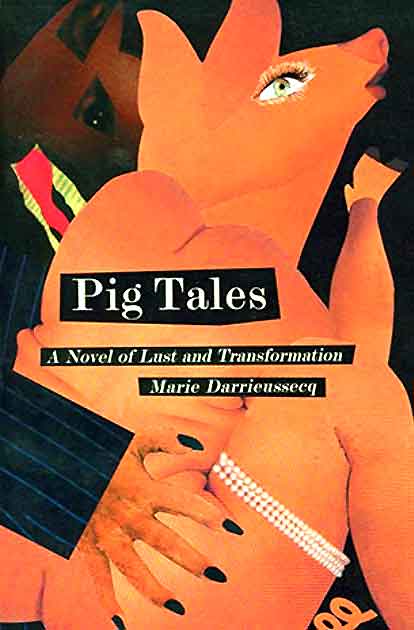 By MARIE DARRIEUSSECQ (The New Press; 1996/97)
By MARIE DARRIEUSSECQ (The New Press; 1996/97)
A word of warning: the misleading cover and description of the English language edition of this French freak-out make it seem like a light-hearted satire in the mold of Franz Kafka and George Orwell. Those authors are indeed recalled in PIG TALES, but I’d add a third name: the Marquis de Sade, whose penchant for the perverse and grotesque is well represented in these pages. That probably explains why the book, despite being a runaway bestseller in its native land, never got much traction sales-wise in the US.
Sensitive readers are advised to steer clear…
Opening with a present tense quote by Knut Hamsun that describes, quite disturbingly, the butchering of a pig. (“At first the boar doesn’t understand a thing, he remains stretched out for a few seconds…Then he realizes he is being killed, and utters strangled cries until he can scream no more”), it tells the first-person story of an unnamed young woman who finds a job at Perfumes Plus, a boutique that doubles as a massage parlor. The woman has a good time working at this place, despite the sexual harassment to which she’s frequently subjected and the fact that she’s just as frequently called upon to serve as a glorified prostitute.
But then she undergoes a transformation in which she sprouts ungainly clumps of hair, grows an extra nipple (followed by two more) and develops a voracious sex drive and appetite—albeit not for pork products—to match, which causes her to become quite rotund. She is, in fact, becoming a were-pig, which is a problem in her profession, in which she’s required first and foremost to be desirable at all times.
“I ate the pizza, Yvan ate the delivery man”
 Luckily the people around this woman are just as twisted, if not more so, than she. There’s Edgar, a conservative politician who takes an immediate fancy to the protagonist in her pig-state (and makes her the belle of the ball at a depraved orgy in which several children are tortured to death), and Yvan, the director of an outfit called Moonlight Madness. That moniker is appropriate given that Yvan is a werewolf with whom the protagonist takes up, with these lovebirds deserting the business world to devote their lives to sating themselves through murder (“I ate the pizza, Yvan ate the delivery man”).
Luckily the people around this woman are just as twisted, if not more so, than she. There’s Edgar, a conservative politician who takes an immediate fancy to the protagonist in her pig-state (and makes her the belle of the ball at a depraved orgy in which several children are tortured to death), and Yvan, the director of an outfit called Moonlight Madness. That moniker is appropriate given that Yvan is a werewolf with whom the protagonist takes up, with these lovebirds deserting the business world to devote their lives to sating themselves through murder (“I ate the pizza, Yvan ate the delivery man”).
Luckily the people around this woman are just as twisted, if not more so, than she.
Sensitive readers are advised to steer clear, but as a dark-hued feminist satire PIG TALES is fairly strong (even if the author’s attempts at creating a future history, complete with oblique references to a fascist takeover of the French government, don’t work at all). It’s marked by a compellingly spare and nonchalant narrative voice, and a sharp-edged satiric thrust that hits its target more often than not.
